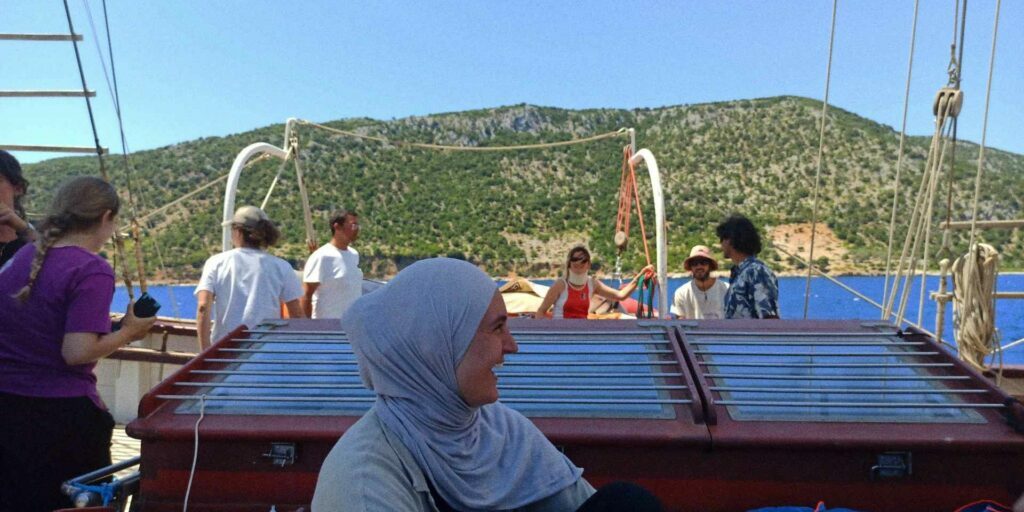« True peace is not when the war ends — true peace is when the divisions end »

Dzeneta, a young woman participating in session 5 between Istanbul and Athens testifies to the reconstruction of her country after the war, during the Peace Ceremony held in Athens on July 18, 2025.
« The war in Bosnia and Herzegovina, which lasted from 1992 to 1995, left deep scars on the country and its people. It was a brutal conflict between neighbors, driven by ethnic tensions and marked by horrific crimes, including genocide, sieges, and mass killings. Over 100,000 lives were lost and millions were displaced. The war officially ended with the Dayton Peace Agreement, but true peace — the one that lives in people’s hearts and everyday life — is far harder to achieve.
Today, peace in Bosnia and Herzegovina is more formal than real. Though the weapons have long fallen silent, the war still lives on — in memories, in everyday conversations, and in political manipulation. Just one word — “war” — is enough to trigger fear, anxiety, and division. Politicians know this. They use that word not to remind people of the need for peace, but to manipulate emotions, hold onto power, and keep the people divided.
Nearly thirty years after the war, we still face a disturbing reality: two schools under one roof. Children from different ethnic backgrounds attend the same building, but not the same classrooms. They are separated by curricula, teachers, and even hallways — all under the same roof. It’s a symbol of peace on paper, but division in practice.
Yet outside the walls of these schools, those same children play together. They spend time together, they build friendships. They show us, every day, that coexistence is not only possible — it’s natural. The divisions come from above, not from the people.
Unfortunately, a dangerous confusion still exists: religion is often mistaken for ethnicity. For instance, a colleague at work asked me who the refugees were. I said they were coming from Iran, and he replied, ‘Oh, I meant are they Serbs or Croats,’ thinking in terms of their religion — whether they are Catholic or Orthodox.”
But it doesn’t have to be this way. Diversity should be strength, not weakness. The mix of cultures, religions, and traditions in Bosnia and Herzegovina is not a problem to solve — it’s a richness to embrace. Our differences don’t have to divide us; they can teach us, connect us, and make us stronger.
Bosnia and Herzegovina today stands at a crossroads between its past and its future. If we want real peace — not just in documents, but in people’s hearts — we must stop ignoring these problems. We must build a society where children are not educated separately, where faith doesn’t divide us, and where the word “war” is no longer used as a political weapon.
The education system must do more than transfer knowledge — it must offer solutions. It should start from the basics, from what makes us all human. Because before we are different, we are the same.
Every child — regardless of religion, ethnicity, or nationality — needs water to drink, light to see, air to breathe, and love to grow. These are not religious needs; they are human needs.
That is where education should begin — with shared experience. With the idea that we all need safety, dignity, and opportunity. Children must learn that everyone has the right to knowledge, to believe or not believe, to feel seen and valued. When we start from what we have in common, we create space to understand and respect our differences.
Education should also teach the truth about war — that no one wins. In war, everyone loses something: dignity, humanity, connection. War doesn’t build — it breaks. It doesn’t unite — it divides. And what it leaves behind is mistrust and fear.
When disasters strike — earthquakes, floods, fires — they don’t ask what religion you belong to. They affect Muslims, Christians, Jews, atheists — everyone. The sun shines on all of us equally. So why should peace, dignity, and opportunity be any different?
We should not need tragedy to discover our common humanity.
That’s why education must help the next generation see beyond what separates us — and recognize what holds us together. Not by ignoring differences, but by honoring them — while building a deep sense of shared humanity.
Only when children understand this can they grow into adults who choose unity over division, and peace over hate.
Because our future depends not on how different we are — but on how willing we are to understand those differences, and turn them into strength.
True peace is not when the war ends — true peace is when the divisions end.
Peace for Gaza. Peace for Sudan. Peace for Ukraine. Freedom for Palestine. Freedom for Uygurs in China. Justice for all. Peace for all people on the move. »
Dzeneta
Publié le 30 juillet 2025